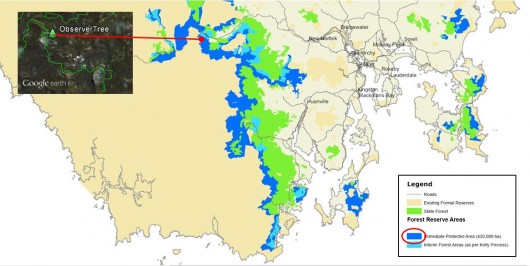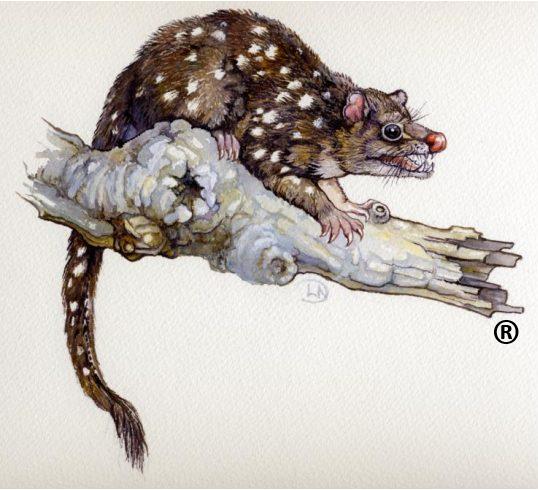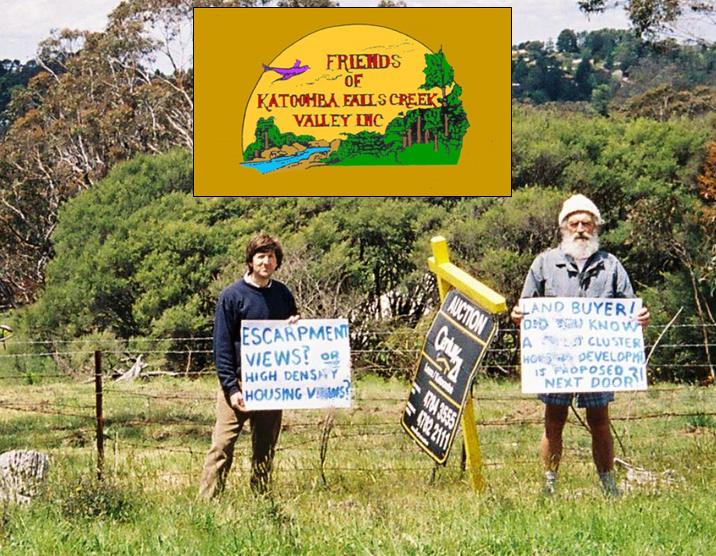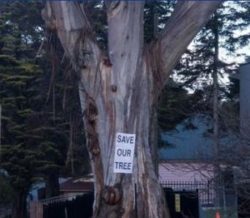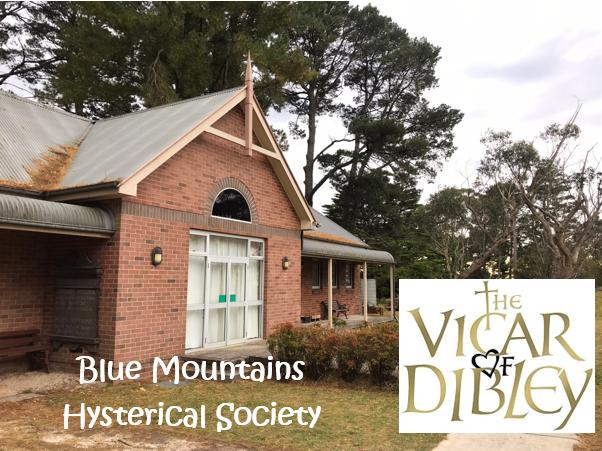Tasmania’s Forest Agreement duplicitous & sly
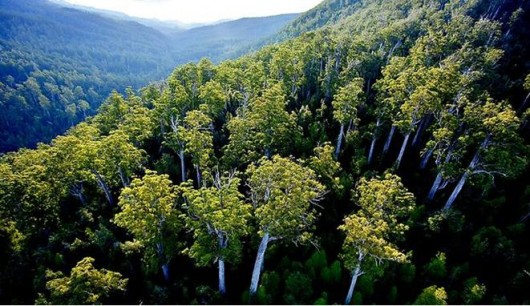 Tasmania’s magnificent ‘Weld Forest’
~ one of Tasmania’s rare ancient forests constantly threatened
by Tasmanian Government recidivist logger ‘Forestry Tasmania’
Tasmania’s magnificent ‘Weld Forest’
~ one of Tasmania’s rare ancient forests constantly threatened
by Tasmanian Government recidivist logger ‘Forestry Tasmania’
.
Australia’s Gillard Labor Government yesterday (20120114) announced an ‘interim legal protection for 428,000 ha’ ahead of tomorrow’s scheduled return of recidivist logging.
This appears good news which obviously the Gillard media release intends. But the process is duplicitous and sly.
Tasmania’s 2011 Forests Agreement is a community agreement about public forest protection involving taxpayer funded Forestry Tasmania so what moral right does the Labor Party have to deny the process being public – i.e. transparent and open? Why is the forest map not publicly online showing the updates of the discussions? Which 1950ha get the chainsaw and why?
This is the only available map. [Read Tasmanian Forest Protection Map 2011]
Professor Jonathan West, Chair of the Independent Verification Group has a lot to answer for. Why has he not voiced outrage publicly of Forestry Tasmania’s illegal logging of the 430.000 hectares of native forests protected in Interim Reserves under the Agreement?
Relative position of the local Tasmanian community protest tree sit The Observer Tree For ongoing updates visit The ObserverTree.org .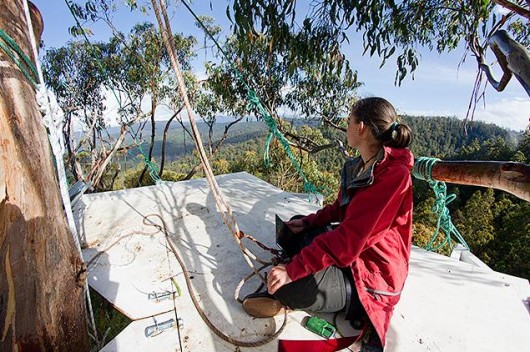 Tasmania’s Forest Defender – Miranda Gibson
stationed in a eco-Tree Sit 60 metres above the Styx Valley Forest floor
Visit: The ObserverTree.org
…waiting for Australia’s Prime Minister Julia Gillard to honour her personal promise to Tasmanians to protect Tasmanian old growth forests for perpetuity.
.
Tasmania’s Forest Defender – Miranda Gibson
stationed in a eco-Tree Sit 60 metres above the Styx Valley Forest floor
Visit: The ObserverTree.org
…waiting for Australia’s Prime Minister Julia Gillard to honour her personal promise to Tasmanians to protect Tasmanian old growth forests for perpetuity.
.
572,000 hectares of Tasmania’s remaining old growth
…’as agreed‘ Julia!
.
‘Tassie forests deal like a Gunn to the head’
[Source: ‘Tassie forests deal like a Gunn to the head’, by political journalist Bruce Montgomery in Hobart, ^http://www.crikey.com.au/2011/09/06/tasmanian-forrests-deal-gillard-and-giddings/]above the Styx
.
‘The $276 million agreement that Prime Minister Julia Gillard and Tasmanian Premier Lara Giddings flaunted only a month ago as the ultimate peace deal to end the 40-year war in Tasmania’s forests is dead in the water. It comes as no surprise to those who have sought to interpret the poorly drafted provisions of the intergovernmental agreement (IGA) signed by Gillard and Giddings and those of the agreement that preceded it, the so-called Statement of Principles.
The Statement of Principles was the product of those purporting to represent the Tasmanian forest industry and the conservation movement to achieve a peace, most recently under the guidance of former ACTU secretary Bill Kelty.
Both documents appear to have been the work of plant operators rather than draftspeople. Grammar and proofing blunders aside, the giant flaw in both agreements has been the right of conservation groups to identify and nominate another half a million hectares of Crown land in Tasmania to be annexed into reserves, perhaps to the status of national parks or World Heritage, in order to neuter, by law, the timber industry in Tasmania and to pay alms to its victims.
Private foresters, who manage 26% of the total forest cover, were excluded from the negotiations on the pretext that the talks did not involve forests on private land, yet clause 31 of the IGA specifically drags 885,000 hectares of private forests into the equation.
Such a deal, whether concluded at NGO or government level, was never going to pass Tasmania’s Upper House, the Legislative Council. If it did come to pass, it would seal the fate of the Labor-Green governments in Canberra and Hobart as far as Tasmanian voters were concerned.
The premise for the Statement of Principles and the IGA was that the major industrial player, Gunns, was getting out of native forest logging in favour of plantations in order to swing public and banker support behind its $2.5 billion pulp mill proposal at Long Reach on the Tamar River.
In effect, Gunns was about to place all its eggs in one basket, a world-scale pulp mill using only plantation timber. Both agreements hinged on Gunns getting government compensation for its departure from public native forests, yet the mood in Tasmania has clearly been that Gunns should get nothing; its exit from native forests was being made on purely commercial grounds; it was immaterial that it had residual rights to use the public native forests.
If the Giddings government had been responsible for giving Gunns one red cent from the overall $276 million compensation package for the IGA, it would have faced political and electoral oblivion.
We don’t know what Gunns was offered in the end. It is thought to have been $23 million, but on the proviso that it pay its debts to Forestry Tasmania, a disputed $25 million.
Yesterday the Tasmanian government confirmed Gunns had rejected the offer, though Gunns, which has been in a trading halt on the stock exchange since August 8, said nothing.
Assuming that is right, it has the option to place those forest rights on the market. Since the IGA depends on those forests being protected, the keystone to the agreement is gone.’
.
‘Tasmanian forest deal riles green groups‘
[Source: ‘Tasmanian forest deal riles green groups’, by Lanai Vasek and Matthew Denholm, ‘The Australian’, 20120113, The Australian: ^http://www.theaustralian.com.au/national-affairs/tasmanian-forest-deal-riles-green-groups/story-fn59niix-1226243780040].
The Gillard Labor Government has announced interim legal protection for 428,000 ha of Tasmania’s forests, but has been accused of reneging on a deal to deliver a larger logging ban.
 Australia’s 27th Prime Minister, The Hon. Julia Gillard (June 2010 – ?)
In her vital and privileged position, she has the power, influence, connections and taxpayer resources
to protect Tasmania’s 572,000 hectares of old growth native forests consistent with the IGA.
As usual, it comes down to political will, courage and innovative thinking – which is what we expect of our leaders.
Australia’s 27th Prime Minister, The Hon. Julia Gillard (June 2010 – ?)
In her vital and privileged position, she has the power, influence, connections and taxpayer resources
to protect Tasmania’s 572,000 hectares of old growth native forests consistent with the IGA.
As usual, it comes down to political will, courage and innovative thinking – which is what we expect of our leaders.
.
Environment Minister Tony Burke announced the move today after the Greens suspended normal relations with the government in protest at continues logging of areas deemed sensitive.
The new Conservation Agreement with the Tasmanian Government falls 1950ha short of the forest protection promised under last year’s intergovernmental agreement (IGA) between the Gillard and Giddings governments.
This provoked an angry reaction from environment groups, who said it had “shaken” their confidence in the two governments’ ability to deliver a broader agreement to protect up to 572,000ha.
And Greens leader Bob Brown said it was “a blueprint for the destruction of more than 20 square kilometres of high-conservation value forests”.
…The agreement provides legal protection to the area until an independent process decides how much of the larger area of 572,000ha deserves protection and can be locked up without harming existing timber contracts.
Mr Burke said the new interim deal was good for both forest conservation and jobs and would allow all parties to focus on supporting the longer-term independent verification process, expected to complete by June.
“With this agreement in place, all parties can now concentrate their efforts on assisting the important work of the Independent Verification Group, which is assessing the conservation values of the entire 572,000ha nominated by environmental non-governmental organisations, in addition to verifying long-term timber supply requirements,” Mr Burke said.
“This is a good result for Tasmania’s forestry industry, for local jobs and communities while protecting Tasmania’s iconic forests.”
However, the Wilderness Society, the Australian Conservation Foundation and Environment Tasmania all condemned the two governments for allowing logging in the 1950 ha, saying this included iconic, ancient forests in the Styx Valley, Weld Valley and The Tarkine, including endangered species habitat.
Earlier this week Greens leader Bob Brown said he would not resume his regular meetings with Julia Gillard once parliament returns next month unless she committed to ending logging. This afternoon, Senator Brown said he remained open to ad-hoc talks with Ms Gillard, who will visit Tasmania on the weekend, but accused her of reneging on the promise to protect the full 430,000ha in the IGA announced in August last year.
.
How is Tasmania’s Premier Lara Giddings dealing with the colonial cultural right to log Tasmania’s remaining ancient forests?
Only when Tasmania’s condemned old growth forest is ultimately logged, will neanderthal loggers ugg…
.
‘Where’s me big trees gone’ ?
Bill Kelty’s drafting of the IGA was a contradictory hoodwink
.
While the public message is $276 million (no less) to exit native forests and a logging moratorium, what is Lara Giddings saying privately to Forestry that we see its business as usual pursuing old growth logging self-righteously on its perceived right to log?
Under the conservation agreement, the Tasmanian government agency Forestry Tasmania is restrained from logging swathes of disputed public forest while the deal is settled. However, evidence has been found of Forestry Tasmania continuing to penetrate its logging deep into these wilderness forests. Meanwhile the contradictory message by the Giddings Labor Government to the Tasmanian forest industry is that it has a ‘guaranteed wood supply‘.
Perhaps having the $276 million cake she says its ok to log the forest too!
In 2004 the Timber Workers for Forests (TWFF) defended their “statutory requirement that a minimum of 300,000 m3 of high quality Eucalypt veneer and sawlog be made available annually.” It’s ‘Logging Statutory Requirement‘ versus ‘Native Logging Moratorium‘ allowing a duplicitous and sly parallel government message process.
Bill Kelty’s drafting of the IGA was worse that a compromise. Its complex and contradictory legalese was a hookwink. Kelty’s wording allowed Forestry to have its cake and eat it. On the one hand it promises Conservation (lumped as “ENGO’s”) under Clauses 25, 26 and 27 …”The State will immediately place the 430,000 ha of native forest…into Informal Reserves.”
While at the same time it also guarantees Forestry wood supply for the remaining industry under Clause 17…”At least 155 000 thousand cubic metres per year of high quality sawlog, by regulation, 265 000 metres per year of peeler billets, a speciality timber supply, noting that the industry claim is 12,500 cubic metres per year, subject to verification.”
So Forestry has has a window of logging opportunity to go for it while Professor Jonathan West’s Independent Verification Group decides the exact boundaries of the 430,000 and 572,000 for either protection or the chainsaw (Clause 20). That decision was due 31st Dec 2011, two weeks ago.
.
“It is little wonder that many Tasmanians now worry that the woodchippers’ greed destroys not only their natural heritage, but distorts their parliament, deforms their polity and poisons their society. And perhaps it is for that reason that the battle for forests in Tasmania is as much about free speech and democracy – about a people’s right to exercise some control over their destiny, about their desire to have a better, freer society – as it is about wild lands.”
[Source: ‘Out of Control: The tragedy of Tasmania’s forests’, by Richard Flanagan, in The Monthly, May 2007, ^http://www.themonthly.com.au/monthly-essays-richard-flanagan-out-control-tragedy-tasmania-s-forests-512].
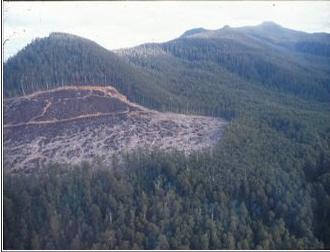 Logging invades Tasmania’s South-West wilderness in the Huon valley,
not far downstream of the above photo.
This logging is ruining the integrity of the adjacent Tasmanian Wilderness World Heritage Area
whose boundaries have been drawn to protect the treeless mountaintops
and leave the forested valleys to the loggers.
Logging invades Tasmania’s South-West wilderness in the Huon valley,
not far downstream of the above photo.
This logging is ruining the integrity of the adjacent Tasmanian Wilderness World Heritage Area
whose boundaries have been drawn to protect the treeless mountaintops
and leave the forested valleys to the loggers.
.
Tags: Bill Kelty, Forestry Tasmania, Gillard Labor Government, Independent Verification Group, Julia Gillard, Labor Party, Lara Giggings, old growth forest, recidivist logging, Tasmania, Tasmanian Forests Intergovernmental Agreement, Weld Forest
